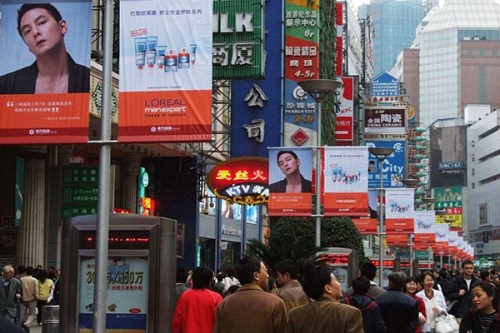
An advertisement for men's skin care products along Nanjing Road in Shanghai. (Photo/China Daily)
There have been huge shifts in Chinese masculinity in recent decades. After reform and opening up the country, "the working landscape quickly started diversifying, and new aspirational models such as the white-collar worker or company man appeared", Schwartz said.
Initially, the Western aspirational model, including "the American dream", was pervasive, she said, but a wider range of models have appeared in China in recent years.
Examples include the comeback of the junzi, or Chinese Confucian gentleman, or the appearance of the xiaoxianrou (literally little fresh meat), a youth model that Schwartz believes is influenced by the pop culture of Hong Kong and Taiwan.
Sharon Chen, a strategist with the advertising company Leo Burnett China, said: "We always begin (our projects) by exploring the needs of people through market research. Once we identify the insight, we compare it against the benefits that the product can offer to nail down what is really relevant for consumers."
The company has been involved in numerous brand campaigns that target Chinese men, including the one for the Buick Excelle car.
"Their target audience is males between the age of 25 and 40," Chen said. "The insight we found about this group of males is that they are a generation of niu (cattle), ai (love) and chong (dashing).
"Niu refers to catching up with others when everything happens so quickly at this point of time in history, they need to work like cattle to make it," Chen added.
"Ai demonstrates that they have a strong mission to protect their families, and families come first for them. Chinese males are becoming more aware of their role in the family, not just as breadwinners, but also loving husbands and fathers."
"Chong shows that working hard is not good enough," Chen said. "They will have to work with explosive momentum to keep up with the pace of a fast-moving economy."
The perception of Chinese masculinity has recently been reflected in Men and Masculinities in Contemporary China, a book by Hird and Song Geng, associate professor at the University of Hong Kong.
In the book, Song and Hird offered an account of Chinese masculinity in media coverage and everyday life. This covered masculinity on television, in lifestyle magazines, and at work and at home.
"Masculinity has become diversified in today's China. It has become a mixture of traditional Chinese discourses fused with the influence of Western types of masculinity, such as the businessmen and the metrosexual type," Song said.
To build a connection between their research on gender in China, and the media and advertising industries in the West, Song and Hird hosted a workshop at the University of Westminster in London in May entitled: "Understanding Chinese men and masculinity".
Song said the new trends and images in China that they talked about at the workshop may be useful for European businesses that want to explore the market of male customers here.
"Men, especially Chinese men, have been largely ignored as gendered beings in the past, and this awareness of their gender will help promote products targeting the male market," Song added.


















































